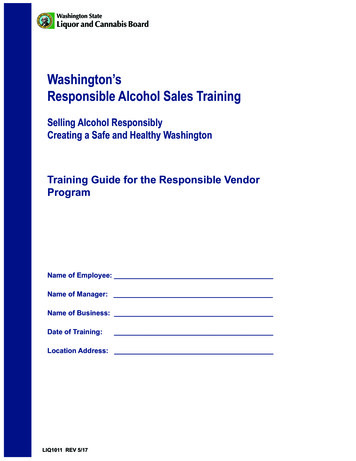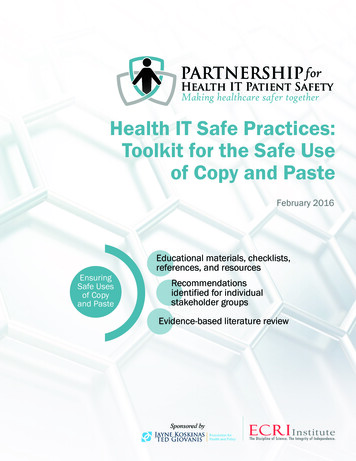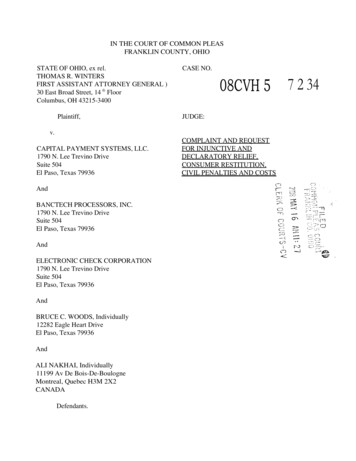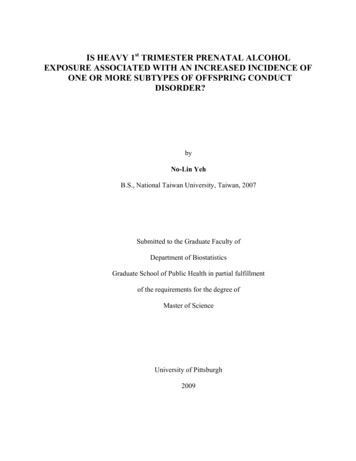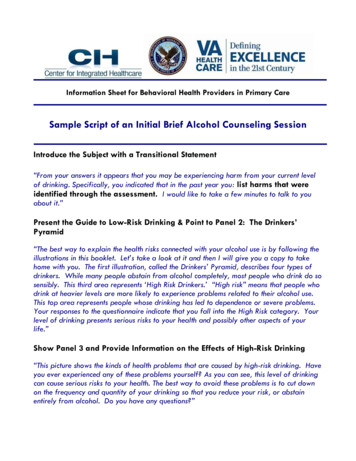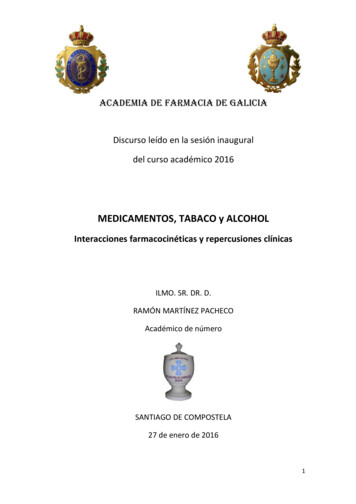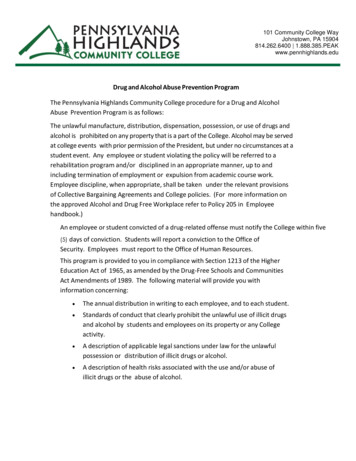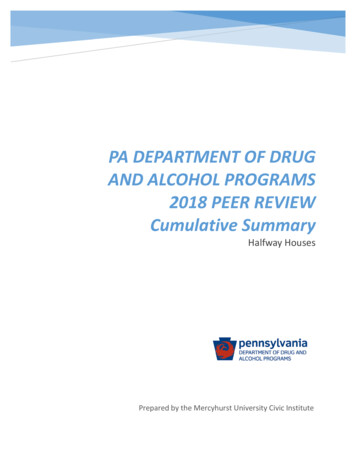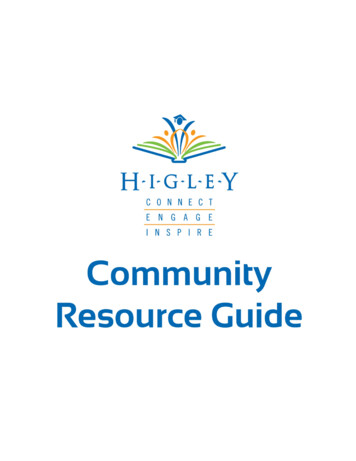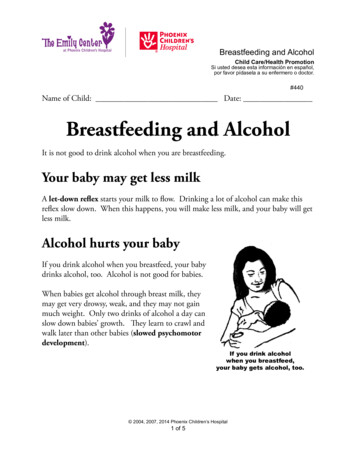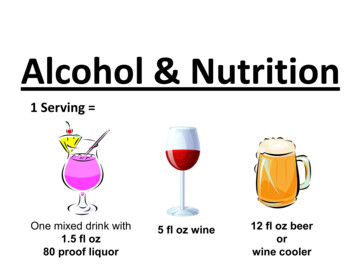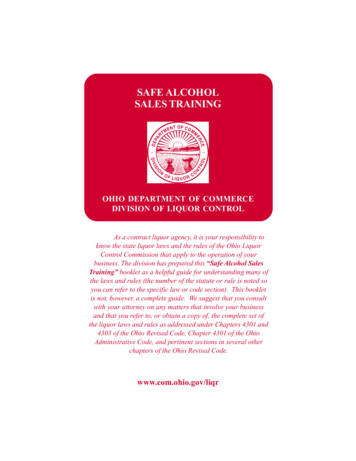
Transcription
SAFE ALCOHOLSALES TRAININGOHIO DEPARTMENT OF COMMERCEDIVISION OF LIQUOR CONTROLAs a contract liquor agency, it is your responsibility toknow the state liquor laws and the rules of the Ohio LiquorControl Commission that apply to the operation of yourbusiness. The division has prepared this “Safe Alcohol SalesTraining” booklet as a helpful guide for understanding many ofthe laws and rules (the number of the statute or rule is noted soyou can refer to the specific law or code section). This bookletis not, however, a complete guide. We suggest that you consultwith your attorney on any matters that involve your businessand that you refer to, or obtain a copy of, the complete set ofthe liquor laws and rules as addressed under Chapters 4301 and4303 of the Ohio Revised Code, Chapter 4301 of the OhioAdministrative Code, and pertinent sections in several otherchapters of the Ohio Revised Code.www.com.ohio.gov/liqr
IntroductionIt is the responsibility of the Ohio Department Commerce, Divisionof Liquor Control to provide you, our contract agents, with the spirituous liquor products you need to meet the demands of your customers.Along with the authority that you have been given as an authorizedliquor sales agent, or agency employee for the state of Ohio, comes theresponsibility to uphold the division’s mission:“To provide for the safe sale and consumption of alcoholic beverages inOhio.”The Safe Alcohol Sales Training program is designed to assisteach of you involved in the sale of spirituous liquor. In addition to beingthe “eyes and ears” of the division, we consider our contract agents andtheir employees to be representatives of the division and the state ofOhio, as well. This program will instruct you about the two types of“customers of concern,” and emphasizes your responsibility to deal withthese customers in a proper manner.Strict adherence to the laws related to sales to underage andintoxicated persons is absolutely essential to your operation. We expectyou and your employees to set the example for safe, responsible salesstandards that other permit holders will follow.You have been entrusted with the privilege of acting as an agent forthe Ohio Department of Commerce, Division of Liquor Control, and webelieve that you take this responsibility seriously. The division willprovide every resource available to help you be successful in thisendeavor. Working together we can continue to uphold our excellentreputation as a control state with a record for safe and responsible salesof spirituous liquor.
Table of ContentsSUBJECTPAGEIntroductionBasic Concepts of Reponsible Beverage Service1Sales to Underage PersonsSales to Intoxicated PersonsResponsible Beverage Service is Necessary4Review Section5Selected sections of Ohio’s liquor laws and rules from the OhioRevised Code (ORC) and Ohio Administrative Code (OAC).ORC 4301.22Restrictions on sales of beer and liquor7ORC 4301.69Offenses involving underage persons9ORC 4301.634Misrepresentation by a person under theage of twenty one12Good faith acceptance of false identification12Penalties for violating Ohio’s liquor laws13Transaction scan in connection with saleor allowing admission to permit premises15Transaction scan as affirmative defense18ORC 4301.639ORC 4301.61ORC 4301.611OAC 4301:1-1-56 Employment of underage persons19OAC 4301:1-1-46 Miscellaneous restrictions20Resource Directory22
Basic Concepts of Responsible Beverage ServiceAs a liquor sales agent for the Ohio Department ofCommerce, Division of Liquor Control, you can sellspirituous liquor for off premises consumption only.This establishes two major “customers of concern”in your business: the underage customer and theintoxicated customer. The following informationprovides options for maintaining friendly service whenthe sale of alcohol is not an alternative.Sales to Underage PersonsOhio law prohibits the sale of alcoholic beverages to persons under21 years of age. Ohio Revised Code Section 4301.22(A) (see page 7)states in part, “.no beer or intoxicating liquor shall be sold to anyperson under 21 years of age.” The penalty for this violation is a fine upto 500 and/or 60 days in jail. Ohio Revised Code Section 4301.69(see page 9) further provides that no person shall sell or furnish beer orintoxicating liquor to a person under 21 unless given by a physician inthe regular line of his practice, or given for established religious purposes, or unless the underage person is accompanied by a parent, aspouse who is not underage, or a legal guardian. Violation of this lawis a misdemeanor and can result in a fine up to 1,000 and/or up to sixmonths in jail. For a liquor sales agent, this could mean termination ofyour liquor agency contract with this division.Underage persons who are involved in the purchase of beer orintoxicating liquor also face criminal charges. Section 4301.69 of theOhio Revised Code (see page 9) prohibits a person under 21 fromordering, paying for, sharing in the cost of, attempting to purchase,consuming, or possessing any beer or intoxicating liquor. The penaltyfor violating this section is a fine up to 1,000 and/or six months in jail.In addition, no underage person can knowingly furnish false informationin an attempt to purchase beer or intoxicating liquor pursuant to Section4301.634 of the Ohio Revised Code (see page 12). Violation of thislaw can result in a fine up to 1,000 and/or six months in jail.1
Ohio Revised Code Section 4301.639 (see page 12) provides adefense for a seller who, in good faith, accepts spurious or false identification, providing the seller complied with the outlined procedures of thissection. It is the duty of the seller to question any person who, fromtheir physical characteristics, appears to be underage. Before sellingbeer or intoxicating liquor to any youthful appearing person, they mustpresent a valid photo driver’s license, chauffeur’s license, or state ofOhio identification card correctly identifying their age. Laxity andindifference to purchases of alcoholic beverages by underage personswill not be tolerated. Obtaining satisfactory proof of a purchaser’s ageis the direct responsibility of the person making the sale. The seller musttake every precaution to prevent illegal sales, and when there is a doubtand the buyer cannot prove their age, the sale must be refused.There are many indications that can help the seller identify anunderage buyer. These may include, but are not limited to: slightphysical build in the shoulders, chest, hips, arms and thighs; lack offacial hair; thin and “unweathered” hands; physical signs of nervoustension; high pitched or cracking voice; excessive talking; inappropriateclothing or jewelry for the simulated age; or incorrect responses toquestions.Acceptable forms of identification are a valid driver’s license, anofficial state of Ohio identification card for a non-driver, or a militaryidentification card issued by the U.S. Department of Defense. Whenproper identification is produced, be certain to verify the age and tocompare the physical description on the identification to the buyer’sappearance. To signify an underage person, valid Ohio driver’s licensesand official Ohio identification cards have a red strip at the top of thecard and the photo is placed on the left side. There is also an “Under21 until.” line on these cards to provide a clear way to determine whena person turns 21. Persons under the age of 21 are issued Ohiodriver’s licenses and/or official Ohio identification cards that have all thesame features signifying an underage person that the older cards have,but now also have a vertical orientation (the photo appears at the top ofthe card, just below a red strip). Also, check to make sure the identification has not been altered in any way. For example, a valid Ohiodriver’s license and Ohio identification cards will feature holograms ofthe great seal of Ohio and “Don’t Drink and Drive” holograms thatappear in several places throughout the face of the card. Ohioans who2
have previously been issued a horizontal license or identification cardwill not be required to convert to a vertical license or identification card.Under 21 horizontal licenses and identification cards will be phased outover five years. Licenses and identification cards issued to personsunder 21 years of age are issued until the person turns 21.Another means by which a permit holder can determine whether aperson is 21 years of age is by using a transaction scan device (seepages 15 and 18). These devices are used to check the validity of adriver’s license or an identification card. However, permit holders andtheir employees must be aware that they should not rely exclusively onthe machine. Merely scanning the identification through the device is notsufficient. The clerks must ensure the person handing them the identification is actually the person that appears on it. Steps must be taken toverify the identification being presented accurately represents the personpurchasing the alcohol. Failure to do so may result in an underagealcohol sale and lead to charges against the clerk and the permit.It is illegal for any person other than the state to manufacture, sell ordistribute in any manner an identification card issued for the purpose ofestablishing a person’s age that displays the great seal of Ohio or thewords “Ohio,” “State,” “Official,” “Chauffeur,” “Commercial Driver,”“Driver,” “Operator,” or any other designation that represents the cardas the official driver’s license or identification card of Ohio. Anyviolation of this law is a fourth degree felony punishable by six months tofive years in prison and/or a fine of 1,000 to 2,500 .Further, a person under 21 may not possess any beer or intoxicatingliquor in a public or private place except as provided by law. It is alsoillegal for any person to possess an open container of beer or intoxicating liquor in a public place except when it has been lawfully purchasedfor consumption on the licensed permit premises.Sales to Intoxicated PersonsIn addition to sales to underage persons, it is also a violation ofOhio law to sell alcoholic beverages to anyone who is intoxicated.Ohio Revised Code Section 4301.22(B) (see page 7) states that nosales shall be made to an intoxicated person. Violation of this law is athird degree misdemeanor, and can result in a fine of up to 500 and/or60 days in jail.3
A sales clerk should be alert and look for signs that indicate aperson may be intoxicated. Observe the customer’s actions, appearance, speech and other mannerisms to see if they give the impression ofan intoxicated individual. If intoxication is suspected, the sale should berefused.The following clues may be helpful when trying to determine if apatron is intoxicated: bloodshot or glassy eyes; flushed complexion;disheveled hair or clothing; staggering when walking; unsteady on feet;odor of alcohol on breath; uncoordinated actions or movements;incoherent, garbled, slurred or boisterous speech; or profane language.Responsible Beverage Service is NecessaryWe must all accept the responsibility of proper alcohol beverageservice. Be certain not to sell to a patron if there is a question as to theage or sobriety of the customer. You should be aware that recent OhioSupreme Court decisions held the seller of alcoholic beverages liable forthe results of irresponsible service. Therefore, you need to develop yourown techniques and in-house rules to intervene in complex situations.It may be a good idea to maintain an ongoing daily log to note anyunusual incidents or dealings with the “customers of concern” discussedin this pamphlet.Co-workers should be encouraged to support each other, especially when attempting to deal with an unreasonable or irrational customer.4
The duty of responsible beverage service is one that is recognizedby the division, the legislature, and the courts. By working together, wecan make this program a success and ensure the safety of our patronsand all Ohioans.Review SectionResponsible Beverage ServiceA. The two major types of “customers of concern” are:1. The underage customer;2. The intoxicated customer.B. The three basic concepts of responsible beverage service are:1. How to identify the customer of concern;2. Alternatives of service to the customer when the sale ofalcohol is not possible;3. Methods of intervention.Preventing Sales to Underage PersonsA. The laws of the State of Ohio require a person to be 21 yearsof age in order to purchase any alcohol, including beer.B. In addition to always carefully checking a valid form of identification,there are several verbal and non-verbal clues to help the alcohol serveridentify the underage customer.1.2.3.4.5.6.7.slight physical build;lack of facial hair;thin and “unweathered” hands;physical signs of nervous tension;high pitched or cracking voice;excessive talking;clothing inappropriate for the age ;5
8. jewelry inappropriate for the age;9. incorrect replies to questions.Preventing Sales to Intoxicated PersonsA. Ohio liquor law says that “no sales shall be made to an intoxicatedperson.”B. Clues that help identify the intoxicated person are:1.2.3.4.5.6.7.8.9.Bloodshot or glassy eyes;Flushed complexion;Disheveled hair or clothing;Staggering when walking;Unsteady on feet;Odor of alcohol about their breath;Uncoordinated actions or movements;Incoherent, garbled or slurred speech;Boisterous, loud, or profane language.C. The seller should also “interview” the customer to determine if he/she had been drinking before coming into the store.Responsible Beverage Service is a Necessity and a DutyA. You must make sure that each sale is appropriate and legal.B. If there is any question in your mind as to the customer’s age orsobriety, you cannot make the sale.C. If you sell alcohol to an underage or intoxicated customer, not onlyare you breaking the law, you may also be held liable for the resultsof irresponsible beverage service in certain cases involving injury,death or property damage (see Ohio Revised Code section4399.18).6
Selected Sections of Ohio’s Liquor Laws and RulesORC Section 4301.22 - Restrictionson sales of beer and liquorSales of beer and intoxicating liquor under all classes of permits andfrom state liquor stores are subject to the following restrictions, inaddition to those imposed by the rules or orders of the division of liquorcontrol:(A)(1) Except as otherwise provided in this chapter, no beer orintoxicating liquor shall be sold to any person under twenty-one years ofage.(2) No low-alcohol beverage shall be sold to any person undereighteen years of age. No permit issued by the division shall besuspended, revoked, or canceled because of a violation of division(A)(2) of this section.(3) No intoxicating liquor shall be handled by any person undertwenty-one years of age, except that a person eighteen years of age orolder employed by a permit holder may handle or sell beer orintoxicating liquor in sealed containers in connection with wholesale orretail sales, and any person nineteen years of age or older employed bya permit holder may handle intoxicating liquor in open containers whenacting in the capacity of a server in a hotel, restaurant, club, or nightclub, as defined in division (B) of section 4301.01 of the Revised Code,or in the premises of a D-7 permit holder. This section does notauthorize persons under twenty-one years of age to sell intoxicatingliquor across a bar. Any person employed by a permit holder mayhandle beer or intoxicating liquor in sealed containers in connection withmanufacturing, storage, warehousing, placement, stocking, bagging,loading, or unloading, and may handle beer or intoxicating liquor in opencontainers in connection with cleaning tables or handling empty bottlesor glasses.(B) No permit holder and no agent or employee of a permit holdershall sell or furnish beer or intoxicating liquor to an intoxicated person.(C) No sales of intoxicating liquor shall be made after two-thirtya.m. on Sunday, except under either of the following circumstances: (1)Intoxicating liquor may be sold on Sunday under authority of a permitthat authorizes Sunday sales.7
(2) Spirituous liquor may be sold on Sunday by any personawarded an agency contract under section 4301.17 of the RevisedCode if the sale of spirituous liquor is authorized in the applicablepercinct as the result of an election on question (B)(1) or (2) of section4301.351 of the Revised Code and if the agency contract authorizes thesale of spirituous liquor on Sunday.This section does not prevent a municipal corporation fromadopting a closing hour for the sale of intoxicating liquor earlier thantwo-thirty a.m. on Sunday or to provide that no intoxicating liquor maybe sold prior to that hour on Sunday.(D) No holder of a permit shall give away any beer or intoxicatingliquor of any kind at any time in connection with permit holder’sbusiness.(E) Except as otherwise provided in this division, no retail permitholder shall display or permit the display on the outside of any licensedretail premises, or on any lot of ground on which the licensed premisesare situated, or on the exterior of any building of which said licensedpremises are a part, any sign, illustration, or advertisement bearing thename, brand name, trade name, trade-mark, designation, or otheremblem of or indicating the manufacturer, producer, distributor, place ofmanufacture, production, or distribution of any beer or intoxicatingliquor. Signs, illustrations, or advertisements bearing the name, brandname, trade name, trade-mark, designation, or other emblem of orindicating the manufacturer, producer, distributor, place of manufacture,production, or distribution of beer or intoxicating liquor may bedisplayed and permitted to be displayed on the interior or in the showwindows of any licensed premises, if the particular brand or type ofproduct so advertised is actually available for sale on the premises at thetime of such display. The liquor control commission shall determine byrule the size and character of such signs, illustrations, or advertisements.(F) No retail permit holder shall possess on the licensed premisesany barrel or other container from which beer is drawn, unless there isattached to the spigot or other dispensing apparatus the name of themanufacturer of the product contained therein, provided that wheresuch beer is served at a bar the manufacturer’s name or brand mustappear in full view of the purchaser. The commission shall regulate thesize and character of the devices provided for in this section.8
(G) Except as otherwise provided in this division, no sale of any giftcertificate shall be permitted whereby beer or intoxicating liquor of anykind is to be exchanged for such certificate, unless the gift certificate canbe exchanged only for food, and beer or intoxicating liquor, for onpremises consumption and the value of the beer or intoxicating liquor forwhich the certificate can be exchanged does not exceed more than thirtyper cent of the total value of the gift certificate. The sale of giftcertificates for the purchase of beer, wine, or mixed beverages shall bepermitted for the purchase of beer, wine, or mixed beverages for offpremises consumption. Limitations on the use of a gift certificate for thepurchase of beer, wine, or mixed beverages for off-premisesconsumption may be expressed by clearly stamping or typing on theface of the certificate that the certificate may not be used for thepurchase of beer, wine, or mixed beverages.ORC Section 4301.69 - Offensesinvolving underage persons(A) Except as otherwise provided in this chapter, no person shallsell beer or intoxicating liquor to an underage person, shall buy beer orintoxicating liquor for an underage person, or shall furnish it to anunderage person, unless given by a physician in the regular line of thephysician’s practice or given for established religious purposes or unlessthe underage person is accompanied by a parent, spouse who is not
liquor sales agent, or agency employee for the state of Ohio, comes the responsibility to uphold the division’s mission: “To provide for the safe sale and consumption of alcoholic beverages in Ohio.” The Safe Alcohol Sales Training program is designed to assist each of you involv
